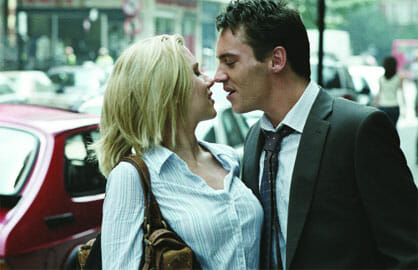Match Point

London Calling: For Woody Allen, neurosis knows no borders
Director/Writer: Woody Allen
Cinematography: Remi Adefarasin
Starring: Scarlett Johansson, Jonathan Rhys-Meyers, Emily Mortimer, Matthew Goode
Studio info: DreamWorks SKG, 124 mins
Imagine Dylan penning raps for Ludacris. Or Robert Altman crafting an intimate, character study. Or Philip Roth writing tawdry romance novels. To purists, the news of Woody Allen shooting a film outside his native, beloved Manhattan is equally hard to digest. But changing locales proves inspirational for Allen in Match Point, his most accomplished film in a decade. The new picture, filmed in London, features another sharp departure—Allen’s decision to part ways, at least temporarily, with longtime collaborators like editor Alisa Lepselter and production designer Santo Loquasto. Surrounding himself with a new set of craftsmen, including production designer Jim Clay and cinematographer Remi Adefarasin, Allen has made a film that doesn’t look or sound like anything he’s done before.
Despite deviating from the formula of his New York comedies—with their sophisticated characters, Jewish angst and Manhattan locales—Allen is still on terra firma. Critical consensus on his recent Gotham films, with their increasingly reliable ingredients, is that they’d become redundant and tiresome, even when cast with younger actors like Jason Biggs and Kenneth Branagh, who slavishly imitated Allen’s neurotic style.
A morality tale of ambition, seduction and passion, the story dwells on the role that chance—or fate, if you prefer—plays in shaping events and personalities. Filled with British characters save for one American (Scarlett Johansson), Match Point could be described as a cross between Dostoevesky’s Crime and Punishment, Altman’s class-conscious period mystery Gosford Park and Allen’s own Crimes and Misdemeanors.
Though he’s traded East Side brownstones for Knightsbridge townhomes, it’s still possible to detect several of Allen’s dependable signatures—characters’ neuroses (by this point a given), highbrow banter and references to Ingmar Bergman. Allen is an auteur who often defines his artistic vision in reference to other filmmakers. In the past, it was hard for savvy viewers to take his “borrowing” in good faith, because he frequently alternated between movies inspired by Fellini (Stardust Memories is Allen’s 8 1/2) and Bergman (Interiors).
-

-

-

-

-

-

-

-

-

-

-

-

-

-

-

-

-

-

-

-

-

-

-

-

-

-

-

-

-

-

-

-

-

-

-

-

-

-

-

-








































